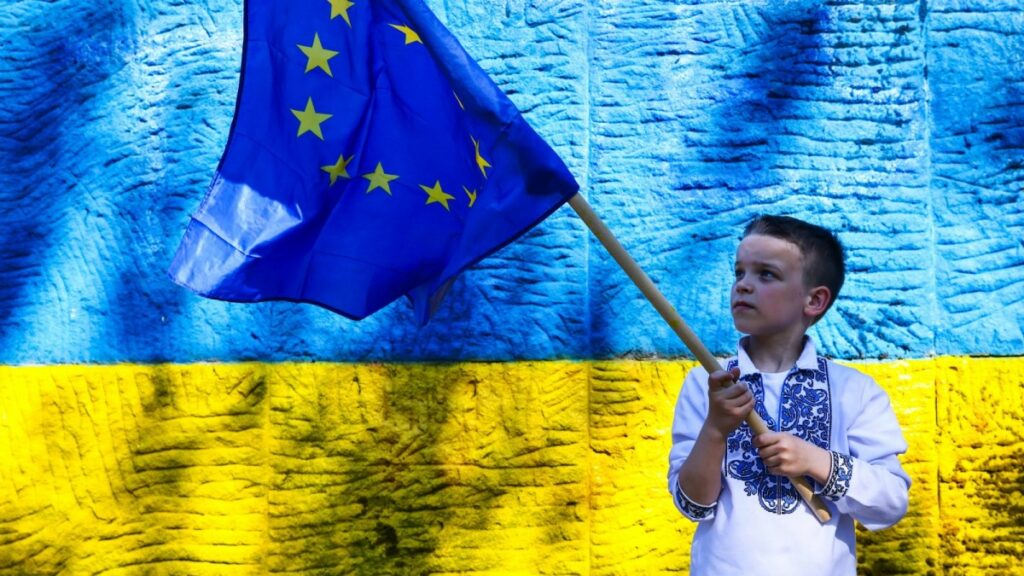June 24 marked a crucial, pivotal European moment of passage for the European Union (EU). Support for Ukraine is a trial by fire for the Union, and its decision to ipso facto approve its candidacy as a member state demonstrates the will of European resilience.
The kernel of this will decides the fate of war to the extent that it concerns human will. War is primarily a force to bend the enemy to one’s will. The Russian Federation’s intention is to bend Ukraine and its core political community, etched in the preamble of the Constitution where it mentions “the European identity of the Ukrainian people and the irreversibility of the European path.”
Will the Russian attack help Ukraine in moving to the European Union?
In striking Ukraine, Russia has also chosen to strike the architect of that path, that is, the EU. The Russian will to power corresponds to the will to suppress that identity. Russia underestimated that while there is a will to power, there is also a will to resist. If the decision of February 24 affirmed the former, that of June 24 demonstrated the latter.
Thus, the warlike fact of the Russian invasion of Ukraine was contrasted with the diplomatic fact of the European accession aimed at Ukraine, corresponding to a historical moment imponderable in its scope.
The Russian war against Ukraine is a piercing political failure
While both uncertain in their outcomes and indeterminate in their developments, these events mark the fate of the belligerents and that of the European Union, caught up in an unprecedented clash of wills.
Furthermore, a policy of European enlargement toward a state at war is unprecedented, considering that enlargement has been the supreme act of EU foreign policy. From that perspective, the war of the Russian Federation against Ukraine corresponds – so far – to a piercing political failure.
Following four months of ruthless attacks and looting, it has not bent whether the European or Ukrainian will focus on the common integration path. On the contrary, the war’s burden of destruction and death has strengthened these wills toward the realization of that Union of states that is fulfilled by common membership in the European Union.
Will is one thing, however, and capabilities are another. It should be borne in mind that the European Union’s enlargement policy had never been pitted against a belligerent enemy which had great political and military capabilities. All that mattered for the success of that policy was the institutional capabilities of the Union and those of the candidate states in moving toward the common goal of integration.
Time was peacetime, not a pressing factor, and the political spaces remained open. That is no longer the case because, whether we like it or not, the policy of Union enlargement to Ukraine confronts a belligerent enemy fighting a candidate state. The time is a time of war that presses every choice, and the political spaces can also close rather than open.
Thus the decision to enlarge to include Ukraine indelibly marks its political estrangement from Russia; it also simultaneously marks a raison d’être and the very existence of the Union in the shadow of war. This condition, both dramatic and topical, catalyzes the entire historical story of a political project-that of European unity-born to avert war and now beset by a war involving its worst wartime crisis since 1951.
Considering that opposing the European Union by fighting Ukraine is a strategic goal of Russia, one prophetic comment by Dmitry Medvedev – vice-chairman of the Security Council of the Russian Federation – should nevertheless be well pondered: “The European Union may disappear before Ukraine enters it.”
European catharsis is over
Although now rancid after four months of the war, this bold and allusive style warns in its own way that the European catharsis is over. With it, the liberation process from the anxiety of war and its proclaimed “irrationality” has ended.
Therefore, it is well to adapt to the present and to remember, whether one likes it or not, that human history is full of unthinkable catastrophes for its victims, confident in the rationality of a history that betrayed them at the very moment of need. This is why it is in the will to resist the will to power that is the key to the European moment enshrined on June 24.
We will know tomorrow what escapes us today, the hidden meaning of essential decisions, and if the time was “right” for these vital choices. We shall see our destiny tomorrow, but we know that those who believe the prophets act lightly and succumb to the disasters they foreshadow.
